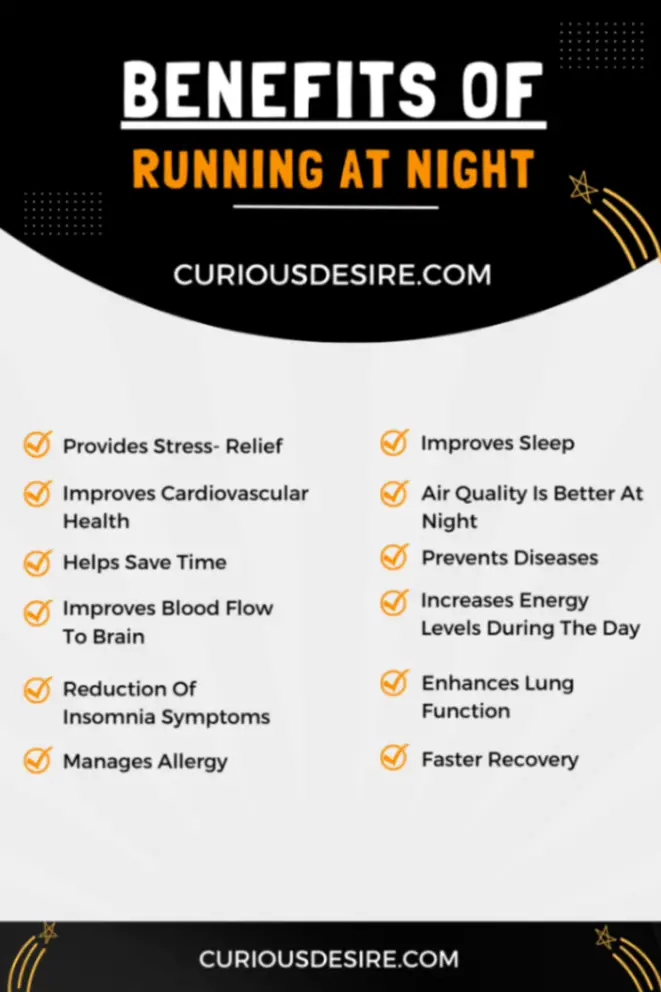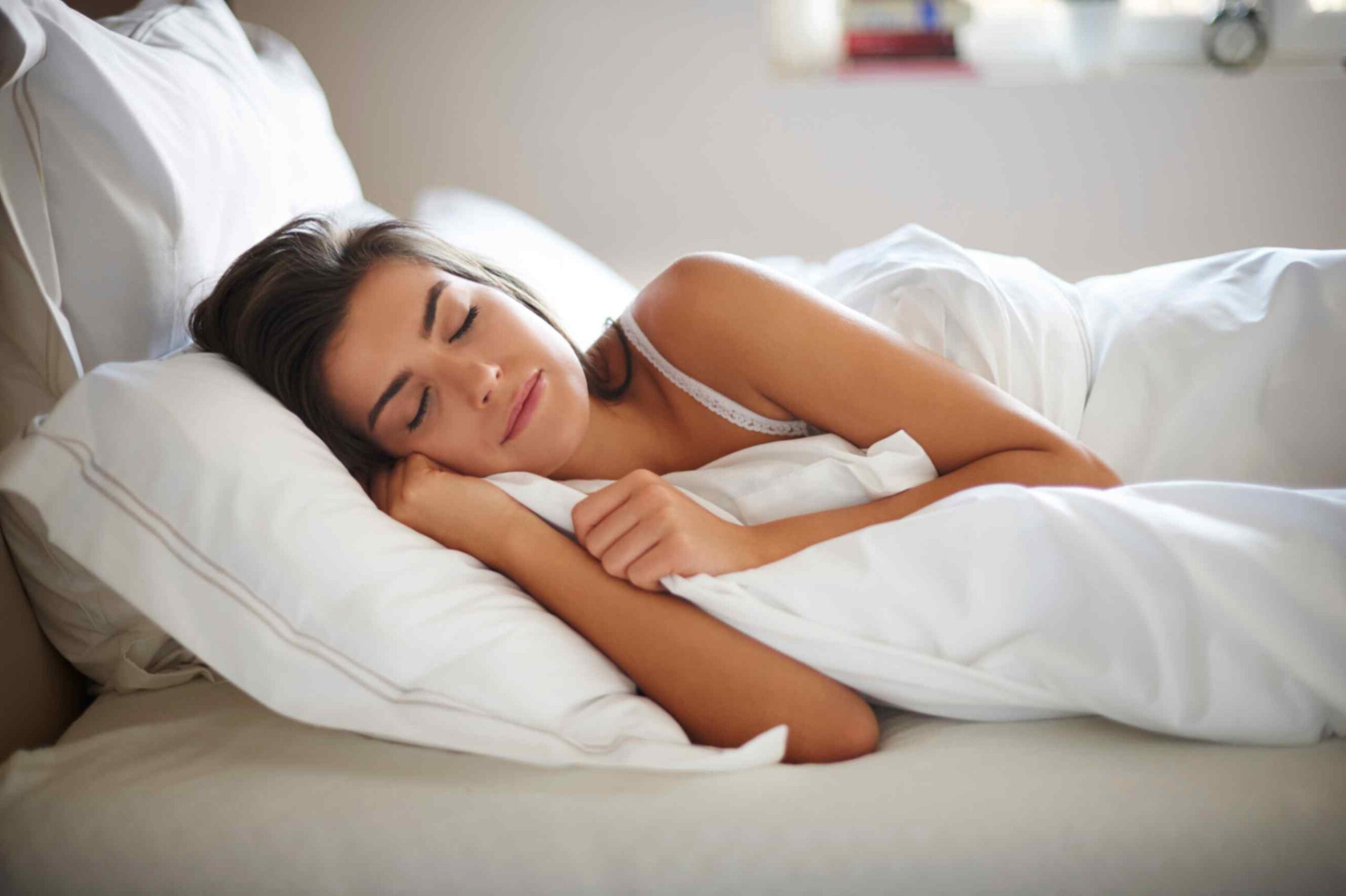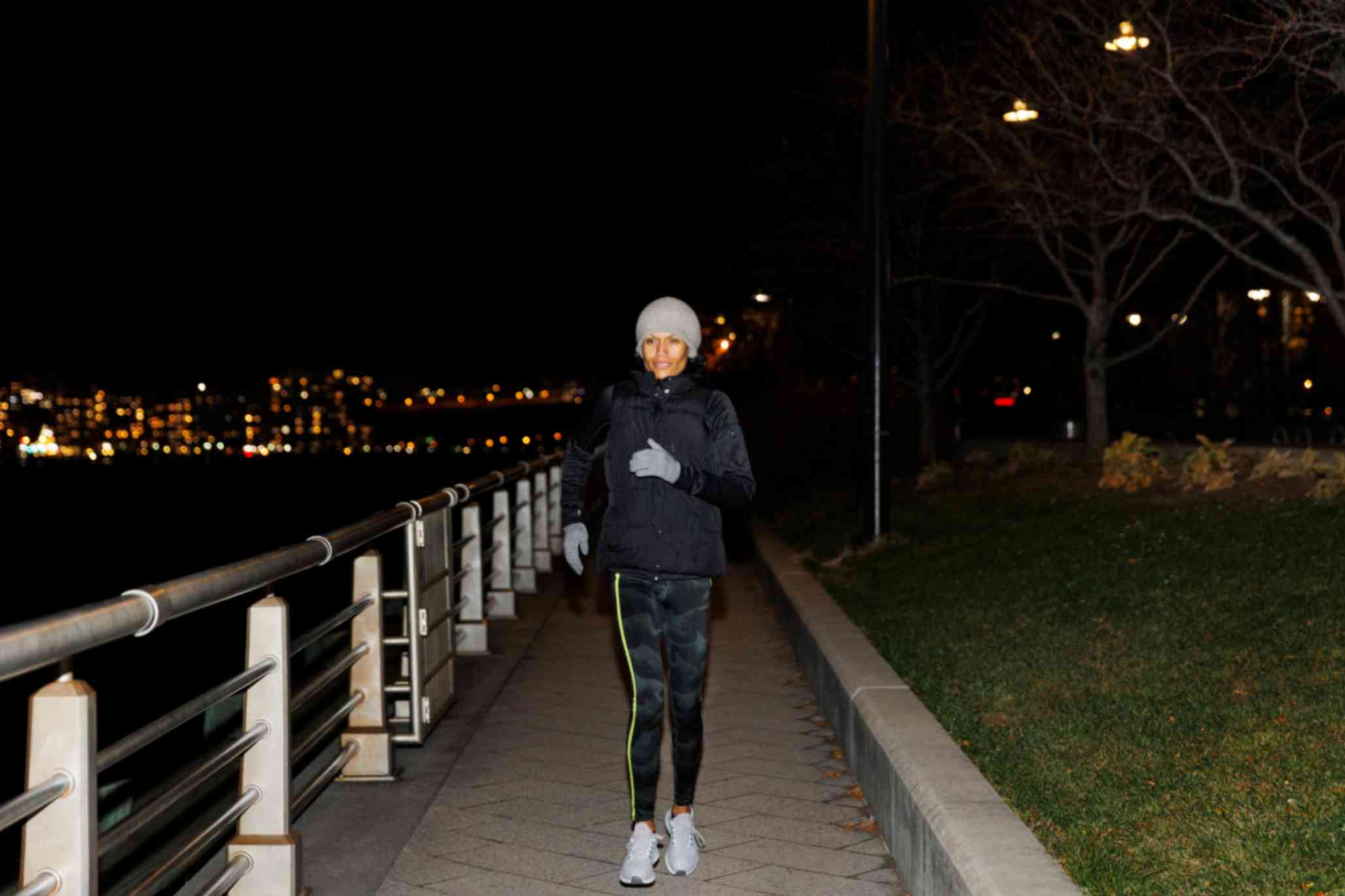Looking to supercharge your fitness routine? Read on, to explore the incredible benefits of running at night.
With modern life keeping us busier than ever, fitting in a workout during the day can be a near-impossible task. However, running at night offers a fantastic alternative, allowing you to reap the rewards of physical activity on your schedule.
Here Are the Top 5 Benefits of Running at Night
- Stress-Relief
- Improved Sleep
- Enhanced Mental Focus
- Weight Management
- Better Cardiovascular Health

Benefit 1: Stress-Relief
Running at night can offer unique stress relief benefits for you. It provides a peaceful and serene environment to unwind after a long day.
As the hustle and bustle of daily life subsides, the calmness of the night can create a peaceful atmosphere that allows you to clear your mind and release the stress piled up throughout the day.
According to research, engaging in physical activity in the evening can significantly reduce stress and anxiety levels, contributing to improved mental well-being.
Running lowers cortisol levels, contributing to stress reduction.
Benefit 2: Improved Sleep
It is one of the most important benefits of running at night. It has a positive impact on sleep through various physiological and psychological mechanisms.
Late-night running can effectively reduce stress, which in turn can improve sleep quality. By engaging in physical activity late at night, you can release tension and reduce stress accumulated throughout the day. This can create a more relaxed mental state helpful for falling asleep and experiencing deeper, more restorative sleep.
Melatonin is a hormone that regulates the sleep-wake cycle. Exposure to natural light during the day suppresses melatonin production. However, running late at night can have the opposite effect, as it stimulates the release of melatonin. This increase in melatonin levels helps induce a state of relaxation and readiness for sleep, improving sleep onset and duration.
Also, running late at night can assist in regulating your body temperature, which is essential for falling asleep and staying asleep. After running, your body temperature gradually decreases. This drop in body temperature supports the maintenance of deep sleep throughout the night.
Exercise, including running, is known to release endorphins, which are neurotransmitters that contribute to reducing stress and anxiety. This can positively impact psychological well-being, leading to improved sleep.

Benefit 3: Improved Cardiovascular Health
Running at night can have various benefits for cardiovascular health, improving heart function, and overall well-being.
Running at night often means cooler temperatures, which can be less stressful on the body and the cardiovascular system. Cooler temperatures can lower heart rates and improve cardiovascular efficiency during exercise. Additionally, running in cooler weather can reduce the risk of heat-related illnesses and exhaustion, allowing for longer and more effective workouts.
Running at night can help regulate the body’s sleep-wake cycle and improve the quality of sleep. Adequate and quality sleep is crucial for overall health, including cardiovascular health. Research has shown that insufficient sleep can negatively impact cardiovascular function.
Regular nighttime running can also improve cardiovascular endurance, making your heart and lungs more efficient in delivering oxygen to the body’s tissues. This increased endurance can lead to a reduced resting heart rate and improved overall cardiovascular function.
Benefit 4: Better Air Quality
Running at night can offer better air quality compared to running during the day, which can have miraculous health benefits.
One of the key advantages of running at night is the potential for reduced air pollution. During the day, especially in urban areas, traffic congestion, and industrial activities can contribute to high levels of air pollution.
Vehicle exhaust, industrial emissions, and other pollutants can create poor air quality that is detrimental to respiratory health. Running at night allows you to avoid peak traffic times and reduce your exposure to these pollutants.
Breathing in cleaner air during nighttime running can have positive effects on your respiratory health. Reduced exposure to air pollutants can lower the risk of respiratory infections, asthma exacerbations, and other respiratory issues. By choosing to run at night, you can help protect your lungs and airways from the harmful effects of air pollution.

Benefit 5: Time Efficiency
Late at night, the world is quieter than a library. No honking cars, no chatty neighbors – just the rhythmic symphony of your breath and footsteps.
Running at late night can allow you to avoid the rush of the day, providing a quieter and less crowded environment for your workout. With fewer cars on the road and less foot traffic in some areas, you can enjoy a more peaceful experience and potentially cover more ground in less time.
If you have a busy daytime schedule, running at night can provide you a convenient opportunity to exercise after work or other commitments, helping you to fit your workout into your without feeling rushed.
Benefit 6: Disease Prevention
The positive aspect is this rule applies regardless of the time of day you choose to run. Engaging in regular cardiovascular exercise, such as running, can help to improve heart and lung function, lower blood pressure, and reduce the risk of developing cardiovascular diseases.
Running at night also supports weight management and metabolic health. It helps to burn calories, build lean muscle mass, and boost metabolism. These effects can be instrumental in reducing the risk of obesity and related metabolic disorders, such as type 2 diabetes.
By engaging in nighttime running, you can find an effective way to manage stress and improve mental health, which can have broader implications for disease prevention. According to the World Health Organization, chronic stress and mental health disorders have been linked to an increased risk of various physical health issues.
Benefit 7: Improved Blood Flow to the Brain
Improving blood flow to the brain is critical to overall brain health. Running can offer specific benefits for promoting improved blood flow to the brain, which in turn can have significant implications for brain health, and overall well-being.
Nighttime running often occurs in a quieter and less visually stimulating environment compared to daytime. This reduction in external stimuli can lead to a more focused and relaxed mental state, promoting efficient blood circulation to the brain.
Studies have shown that increased blood flow to the brain is associated with improved cognitive abilities, such as attention, memory, and information processing speed. The increased delivery of oxygen and nutrients can support the brain’s ability to function optimally.
Adequate blood flow is essential for delivering glucose, which is the brain’s primary energy source. By ensuring optimal delivery of glucose and oxygen to the brain, nighttime running may support energy metabolism in brain cells, reducing the risk of oxidative stress.
Benefit 8: Increased Energy Levels During the Day
Running, especially at night, can help reduce stress. When we’re stressed, our energy levels can be depleted, and it can be hard to recharge during the day. Running releases endorphins, which are natural stress-fighters. When we run at night, it helps us unwind from the day’s stresses, setting the stage for a more restful night’s sleep, which is crucial for maintaining higher energy levels during the day.
Running at night is more comfortable due to lower temperatures. When running in cooler conditions, the body expends less energy to stay cool, compared to running during the heat of the day. This can help conserve energy and reduce the risk of overheating, leading to higher energy levels the next day.
Nighttime running stimulates the release of neurotrophic factors, such as brain-derived neurotrophic factor (BDNF). These factors support the growth and maintenance of neurons, contributing to sustained energy levels the next day.
Benefit 9: Reduction of Insomnia Symptoms
Roughly, 1 in 3 adults worldwide have insomnia symptoms, and running at night can potentially help reduce insomnia symptoms. Night-time running can help reduce stress and anxiety, which are common contributors to insomnia. Running triggers, the release of endorphins which can promote relaxation and reduce the effects of stress on the body.
Running contributes to an increase in overall energy expenditure. This can potentially lead to a greater sense of physical tiredness, making it easier for you to fall asleep and remain asleep throughout the night.
It can serve as a distraction from negative thoughts that often tag along with insomnia.
Benefit 10: Enhanced Lung Function
Running at night can have several benefits for enhancing lung function. First and foremost, the cooler temperatures at night make it easier to breathe. This is particularly beneficial for people with asthma or other respiratory conditions.
Running at night also offers a quieter and less crowded environment, which can reduce exposure to airborne irritants and pollutants that negatively impact lung health.
Running enhances the efficiency of gas exchange in the lungs, allowing oxygen to enter the bloodstream and carbon dioxide to be expelled more effectively.
Benefit 11: Allergy Management
Running at night can be a helpful strategy for managing allergies due to several environmental factors that can minimize the impact of allergens.
Pollen levels are typically lower in the evening and at night, compared to during the day. By running at night, people with pollen allergies can minimize their exposure to the allergen, thus reducing the likelihood of experiencing allergy symptoms during their workout.
Running at night often means encountering fewer people, vehicles, and industrial activities, which can contribute to lower levels of air pollution. Reduced exposure to air pollution is particularly advantageous for people with allergic rhinitis or asthma.
Another one of the most rewarding benefits of running at night is that it positively impacts sleep quality, which is crucial for people with allergies. Quality sleep supports the body’s ability to regulate inflammation and respond appropriately to allergens.
Benefit 12: Faster Recovery
Running at night can offer several benefits for faster recovery post-workout.
Exercising in the evening means decreased exposure to harmful ultraviolet (UV) rays from the sun. UV radiation can lead to skin damage and increase the risk of sunburn, both of which can impede the body’s ability to recover effectively.
The evening hours often see fewer people using exercise facilities or outdoor running paths, leading to less crowded workout spaces. This reduced congestion can create a more peaceful and focused exercise environment, allowing you to concentrate on your workout without distractions.
Conclusion
Running at night presents a host of benefits that can positively impact your overall well-being.
From improved sleep quality and allergy management to enhanced cognitive function and reduced symptoms of various health conditions – nighttime running provides numerous benefits.
And remember, whether you’re chasing moonlight or simply enjoying the calm evening air, running at night is just the refreshing change you need to elevate your fitness journey. After all, who says the best runs only happen in broad daylight?
Running at Night Benefits FAQs
1. What are the benefits of running at night?
Running at night can provide several benefits, such as a cooler and quieter environment, reduced traffic, and a calming atmosphere for stress relief.
2. Does running at night improve sleep quality?
Yes, many people find that running at night improves sleep quality, as it can help regulate circadian rhythms and reduce stress, leading to better sleep. The post-exercise body temperature drops and endorphins release contribute to a more restful sleep.
3. Will running at night improve my cardiovascular health?
Running at night can contribute to improved cardiovascular health by strengthening the heart, increasing circulation, and reducing the risk of heart disease. This is one of the most popular benefits of running at night.
4. Is nighttime running suitable for beginners?
Yes, nighttime running is suitable for beginners. Start with well-lit and familiar routes, wear reflective gear, and gradually increase intensity. Nighttime running offers a peaceful environment for beginners to focus on building endurance without the distractions of the day.
5. Can running at night increase my overall physical activity level?
Running at night can contribute to increased physical activity levels and overall fitness by providing an opportunity for exercise outside of daytime commitments.
6. Can running at night help with allergies?
Running at night may reduce exposure to outdoor allergens like pollen. Lower pollen levels and cooler temperatures can provide relief for allergy sufferers, making nighttime running a viable option for those with respiratory allergies.
7. How does running at night affect energy levels during the day?
Nighttime running can increase energy levels during the day through improved sleep quality, stress reduction, and the release of endorphins. The overall positive impact on physical and mental well-being contributes to sustained energy levels.
8. Is it safe to run alone at night?
Running alone at night can be safe if precautions are taken, such as running in well-lit areas, informing someone of your route, and carrying a phone for emergencies.